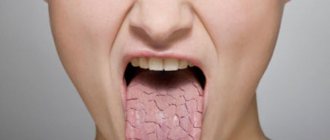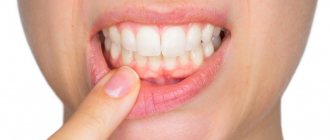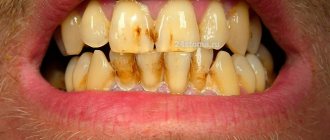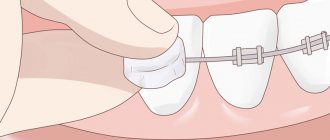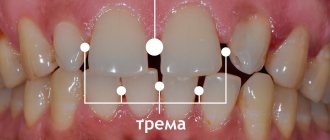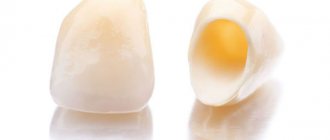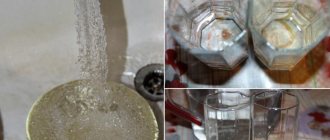Dry mouth is an unpleasant sensation that can be a symptom of serious illnesses. If dry mouth occurs constantly or frequently, it is necessary to understand the cause that is causing it and, if necessary, begin treatment. Elimination of dry mouth, as a rule, is achieved only as a result of treating the underlying disease, which should be the true goal. In any case, the feeling of dry mouth is another reason to pay attention to your health.
Dry mouth is caused by insufficient hydration of the oral mucosa, mostly due to insufficient saliva production. In medicine, dry mouth caused by a cessation or decrease in saliva production is called xerostomia.
.
Quite often, dry mouth occurs in the morning or at night (that is, after sleep).
Symptoms associated with dry mouth
Dry mouth in most cases manifests itself as a complex of symptoms described as:
- "viscosity" or "stickiness" in the mouth;
- thirst;
- irritation of the oral mucosa (burning and itching), the appearance of a bright border of the lips, cracks on the lips and in the corners of the mouth;
- dry tongue. The tongue turns red and becomes rough. It becomes more difficult to speak, chew and swallow. Decreased taste perception;
- dry throat. The voice becomes hoarse and more hoarse;
- there is an unpleasant odor from the mouth.
general characteristics
With insufficient salivation, constant dryness of the mucous membrane, burning and discomfort (burning mouth syndrome), and difficulty speaking are felt.
It becomes difficult for the patient to chew and swallow solid food. Some patients constantly drink water or use special formulations to maintain epithelial moisture. When examining the oral cavity, a small amount of viscous saliva, loss of shine and dryness of the mucous membrane are noted, and surface defects of the epithelium are detected. Saliva has trophic and protective properties for tooth enamel, so with xerostomia, teeth are affected by caries. The absence of lysozyme and nuclease causes a decrease in primary immune defense, which leads to candidiasis, manifested by a white coating on the epithelial membrane. Dryness and cracks in the lips are observed, and angular cheilitis often forms - long-term non-healing “jams” in the corners of the mouth. Elderly patients may complain of constant trauma to the mucous membrane when wearing prostheses.
Causes of dry mouth that are not pathological
In some cases, dry mouth is not associated with a medical condition. For example:
- Dry mouth can occur in the morning and at night due to intoxication. This is a typical situation after drinking too much the night before.
- When nasal breathing is impaired, a person breathes through his mouth during sleep. The mouth is slightly open, and the oral mucosa dries out faster. Nasal breathing can be impaired due to a runny nose, nasal polyps, or a deviated nasal septum. A similar situation occurs with snoring. The cause of snoring in most cases is a decrease in the tone of the soft palate. Muscle weakening develops with age. This is why older people snore more often, and their oral mucosa becomes dry. This reason explains dry mouth in the morning in the elderly in most cases.
- If you don't drink enough fluids in hot weather, you shouldn't be surprised by dry mouth. A similar effect can be caused by eating highly salted foods.
- Many medications can cause dry mouth.
- Smoking is another common cause of dry mouth.
- Dry mouth can be one of the symptoms of menopause.
Purpose of salivary fluid
The normal rate of saliva production for any adult is about 2 liters per day. Of course, all this happens gradually, all the saliva is gradually swallowed. Three pairs of large salivary glands are involved in the work, which are called sublingual, mandibular and parotid. Saliva enters the oral cavity through the passage of ducts. In addition, the mucosa also contains small salivary glands.
This liquid helps to moisturize the surface of the oral cavity, protects it from the occurrence of ulcers, wounds and cracks. It is important to note that salivary fluid also contains the substance lysozyme, which actively resists pathogenic microorganisms and prevents the occurrence of infection.
It is able to neutralize the effect of harmful lactic acid, which appears as a result of bacterial activity. At the same time, the risk of caries becomes much less. Saliva also contains calcium, which is necessary for the natural process of remineralization and strengthening of enamel. A lack of saliva can lead not only to the development of dental diseases, but also to loss of taste, strong odor and even pain.
Diseases that may cause dry mouth
Dry mouth can be caused by high fever and intoxication due to various infectious diseases (flu, sore throat, etc.). Diseases associated with large loss of fluid as a result of vomiting or diarrhea (cholera, dysentery) can also cause dry mouth. In such cases, dry mouth is one of many symptoms and does not attract special attention.
If dry mouth is combined with diarrhea, flatulence, belching, nausea and pain in the left side of the abdomen, then this may indicate pancreatitis.
Dry mouth in combination with a bitter taste, heartburn, white or yellow coating on the tongue can indicate diseases of the gastrointestinal tract such as gastritis, duodenitis, cholecystitis.
Dry mouth can also occur with:
- diseases of the salivary glands;
- endocrine diseases (diabetes mellitus, thyrotoxicosis);
- neoplasms of the oral cavity (benign and malignant);
- damage to nerve endings that contribute to the functioning of the salivary glands;
- anemia;
- vitamin A deficiency;
- systemic diseases (scleroderma, Sjogren's disease, cystic fibrosis).
Functions of saliva in the body
Xerostomia is a condition when the salivary glands stop producing enough saliva. This physiological fluid performs certain tasks in the mouth:
- wetting and softening pieces of food;
- fight against viruses and bacteria;
- lubricating the throat for smooth swallowing of food;
- maintaining the correct biological environment in the mouth;
- protecting teeth from caries.
Without the protective function of saliva, it is easier for a person to get infectious diseases.
Eliminate dry mouth
If dry mouth is caused by drinking alcohol and smoking, then it can only be eliminated by getting rid of the bad habit. It is recommended to reduce the consumption of salty and sweet foods. Pay attention to how you breathe - through your nose or mouth. If nasal breathing is difficult, the cause must be diagnosed and nasal breathing restored. To do this, you will have to see a doctor. It is also important to monitor the humidity in the room.
Dry mouth can be the first symptom of many diseases. Therefore, if you often experience a feeling of dry mouth, it is necessary to understand its nature, determine the cause and, if necessary, consult a doctor and begin treatment for the disease that caused this symptom.
How to prevent
The water-salt balance is restored by drinking plenty of fluids. When you are thirsty, you should drink up to 30-40 ml of liquid per kilogram of weight. Stimulation of saliva secretion is carried out by rinsing the mouth before bed with water and adding drops of lemon juice. Chewing gum and lozenges with citric acid increase salivation.
It is useful to take an infusion of coltsfoot or echinacea. It will prevent the development of colds, rhinitis, and strengthen the immune system during flu and colds. You can sleep peacefully at night, breathing freely through your nose. A sufficient amount of saliva will be released in the mouth during sleep to moisturize the mucous membrane if:
- stop smoking and drinking alcohol;
- eat properly without a lot of sweets and salty foods;
- brush your teeth with pastes containing fluoride, rinse your mouth with special solutions and balms in the morning;
- maintain optimal humidity in the room at 50-60%;
- control the temperature in the room by ventilating it before going to bed;
- engage in physical activity, observing the drinking regime.
Prevention of inflammation in the mouth, gums and teeth is successful with regular visits to the dentist.
Drying of the membranes of the oral cavity is felt especially after a night's rest. This sign cannot be ignored. Only an examination by a specialist and a thorough diagnosis will determine the cause of persistent dry mouth.
Which doctor should I contact for dry mouth?
If you complain of dry mouth, you can contact your dentist or general practitioner (GP or family doctor). After identifying the cause that caused the feeling of dryness, you may be redirected to an endocrinologist, gastroenterologist or rheumatologist.
Most likely, you will need to undergo various tests (general blood count, general urinalysis, blood test for thyroid hormones, biochemical blood test, serological test), and, if necessary, undergo some instrumental studies (ultrasound, radiography, computed tomography).
Diagnosis of the disease
When a patient visits a doctor, the second one performs the following actions:
- Gets acquainted with his complaints, establishes from his words whether there were illnesses that could lead to this problem;
- Applies techniques to determine the amount of saliva produced;
- If necessary, urine and blood tests and ultrasound of the salivary glands can be performed.
To accurately determine the diagnosis and reasons for dry mouth, you may need not only the help of a dentist, but also a psychologist, neurologist, therapist, and rheumatologist. When developing a line to combat the problem, the participation of doctors of several specializations may also be required.
Poor oral hygiene
Poor hygiene is a common cause of xerostomia in healthy people. Dry, rough gums, sometimes itchy and red, are the result of excessively intense brushing, the use of too aggressive mouth rinses, or an allergy to toothpaste.
In this case, you should make care more gentle or replace hygiene products with better ones. Especially if you use alcohol-based rinses. Alcohol dries out mucous membranes.
A good option for careful hygiene would be products from the Asepta series. For example, a rinse based on xylitol, potassium citrate and herbal extracts - it soothes the gums, prevents inflammation and prevents tooth decay. For people with sensitive teeth, ASEPTA SENSITIVE toothpaste is suitable.
Diseases of the respiratory system.
Diseases of the respiratory system are a large group of diseases and conditions that can cause dry throat and require mandatory treatment under the supervision of an ENT doctor. Typically, such diseases are accompanied not only by dryness, but also by other symptoms: runny nose, frequent pain, cough and sore throat. If these symptoms appear, you should definitely contact an ENT doctor for an examination.
What diseases of the respiratory system cause dry throat?
- Acute respiratory viral infections, flu, colds. In addition to a dry throat, the patient has the following symptoms of colds and acute respiratory viral infections: fever, cough, nasal congestion, pain in muscles and joints, weakness, loss of appetite. Treatment is symptomatic: lowering the temperature, eliminating cough and runny nose with medications, as well as drinking plenty of warm fluids.
- Pharyngitis is an inflammation of the mucous membrane of the pharynx. Pharyngitis can be acute or chronic. Based on the nature of the changes in the mucous membrane, catarrhal pharyngitis is distinguished, when swelling of the tissues is observed, hypertrophic, when the mucous membrane thickens, and atrophic pharyngitis, when the mucous membrane, on the contrary, becomes thinner. Attacks of dry cough, red throat, discomfort during swallowing, sore throat - all these symptoms are signs of pharyngitis. Pharyngitis can simultaneously be paired with tonsillitis (inflammation of the tonsils) or laryngitis (inflammation of the larynx). In this case, the patient is diagnosed with tonsillopharyngitis and laryngopharyngitis. The patient is prescribed anti-inflammatory, antibacterial drugs, gargling, irrigation with antiseptics and physiotherapy (to consolidate the positive results from the action of the drugs and speed up the recovery process).
- Tonsillitis. The acute form of tonsillitis is called tonsillitis. If a sore throat is not treated in time, the disease will become chronic, with exacerbations occurring up to several times a year. Unlike pharyngitis, tonsillitis affects not the pharyngeal mucosa, but the palatine tonsils (tonsils). A sore throat occurs with acute pain in the throat, high body temperature, and a white coating or purulent accumulations appear on the tonsils. An effective means of combating sore throat is high-quality antibiotic therapy prescribed by an ENT doctor and physiotherapy performed in an ENT clinic. Chronic tonsillitis is not as severe as a sore throat, but its symptoms also cause the patient considerable discomfort: elevated body temperature, bad breath, sore throat. On the tonsils, purulent plugs are noticeable - accumulations of compressed streptococcus. Plugs support inflammation in the tonsils, so it is imperative to get rid of them. Effective therapy for chronic tonsillitis should be comprehensive and include treatment with medications, rinsing the tonsils from plugs and physiotherapy. In the absence of proper treatment, tonsillitis causes complications in the heart, kidneys and joints.
- Laryngitis is an inflammation of the larynx, which is accompanied not only by dryness, but also by severe itching, barking cough, hoarseness in the voice and itching in the throat, as if the throat is being “teared” from the inside. The treatment regimen for laryngitis includes taking antibacterial or antiviral agents, antiseptic drugs, antitussives, and physiotherapeutic procedures. Also, during treatment it is necessary to give up alcohol, smoking and avoid overstraining the vocal cords. Moisturizing and softening the throat is achieved by drinking plenty of fluids (herbal teas, fruit drinks, compotes, etc. are suitable)
- Pharyngomycosis (or fungal pharyngitis) is an inflammation of the pharyngeal mucosa, the causative agent of which is a fungal infection. Often the disease occurs due to uncontrolled use of antibiotics. The disease occurs with dryness, severe burning, discomfort and pain in the throat. A cheesy coating is noticeable on the mucous membrane of the throat. Therapy consists of taking antifungal, anti-inflammatory drugs, gargling and irrigating the throat with antiseptic drugs. Physiotherapy is an excellent addition to drug therapy.
